Critical Minerals in Africa: Final Report
Critical Minerals in Africa
The United States is seeking to diversify its critical minerals supply chains to strengthen its economic and national security. Meanwhile, many African countries are aiming to develop critical mineral industries, taking economic advantage of the growing demand for their natural resources. The mining sector in Africa presents many challenges, however, including the potential for environmental destruction, labor abuses and even violent conflict due to weak governance. USIP experts are focusing on how the U.S. and its allies can better forge mutually beneficial critical mineral partnerships with African governments in the face of competition with China, which has been growing its presence on the African continent for decades.
Question and Answer
Why Africa’s Critical Minerals Are Key to U.S. National Security
USIP Senior Study Group
In early 2023, USIP convened a senior study group composed of individuals with expert knowledge of mining, Africa, U.S. policy toward Africa and other topics. The group met in four formal sessions, while its secretariat held over 25 meetings with representatives of the mining industry, U.S. government, African governments, academia, civil society and others knowledgeable of the topic. The study group aims to make recommendations on how the United States can build mutually beneficial critical mineral partnerships in Africa.
Final Report of the USIP Senior Study Group
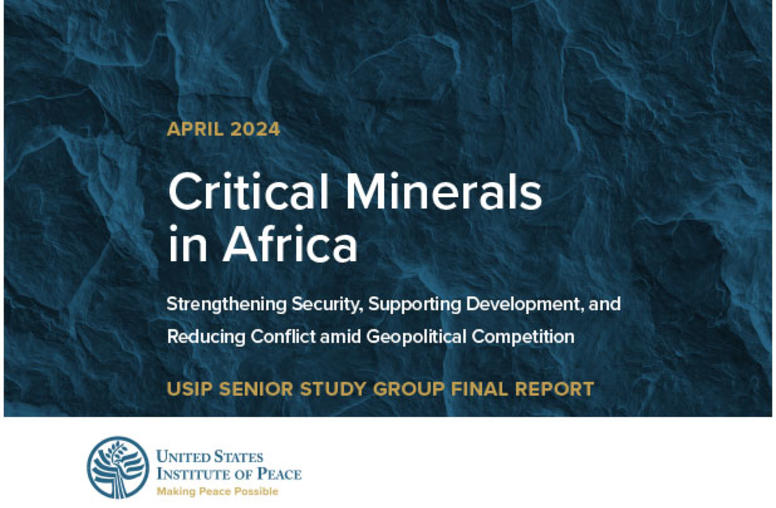
Critical Minerals in Africa
The Senior Study Group's final report offers ways for the United States to diversify its critical mineral supply chains through mutually beneficial partnerships in Africa.
Senior Study Group Members
Members
Edward A. Burrier
Former Senior Advisor, United States Institute of Peace; Former Executive Vice President, US International Development Finance Corporation; Former Deputy Staff Director, House Foreign Affairs Committee
Kamissa Camara
Professor, Weiser Diplomacy Center, Gerald R. Ford School of Public Policy, University of Michigan; Senior Advisor, United States Institute of Peace; Former Minister of Foreign Affairs, Mali
Anthony Carroll
International Advisor, Mining Indaba; Board Member, Global Community Engagement and Resilience Fund; Former Adjunct Professor, School of Advanced International Studies, Johns Hopkins University
Makila James
Former Senior Advisor, United States Institute of Peace; Former US Ambassador to Eswatini; Former Deputy Assistant Secretary of State for East Africa, Sudan, and South Sudan
Darias Jonker
Head of Government and International Relations, Americas, Anglo American; Former Director, Southern Africa, Eurasia Group; Former Assistant Director, Department of International Relations and Cooperation, South Africa
Terence P. McCulley
Senior Managing Director (Africa), McLarty Associates; Senior Visiting Expert for West Africa, United States Institute of Peace; Former US Ambassador to Mali, Nigeria, and Côte d’Ivoire
W. Gyude Moore
Senior Policy Fellow, Center for Global Development; Lecturer, Harris School for Public Policy, University of Chicago; Former Minister of Public Works, Liberia
Carlos dos Santos
Former Ambassador of Mozambique to the United States; Former High Commissioner of Mozambique to Canada and the United Kingdom; Former Permanent Representative of Mozambique to the United Nations
John Simon
Managing Partner, Total Impact Capital; Former US Ambassador to the African Union; Former Deputy Assistant Administrator, US Agency for International Development; Former Executive Vice President, Overseas Private Investment Corporation
Study group members express their support for the general findings and recommendations reached by the group, but do not necessarily endorse every statement or judgment in the report. They participate in the study group in their personal capacities; the views expressed are their own and do not necessarily represent the views of their institutions or employers or of the United States Institute of Peace.
USIP Secretariat
Thomas P. Sheehy, executive director
Distinguished Fellow, Africa Center
Joseph Sany, senior advisor
Vice President, Africa Center
Johnnie Carson, senior advisor
Senior Advisor, Africa Center; Former US Ambassador to Kenya, Uganda, and Zimbabwe
Betsy A. Cody
Writer and Lead Researcher
Lily Arslanian
Legal Research Assistant, Executive Office
Lieutenant Colonel C. Haywood McMillan
Army War College Fellow
Hannah Jackson
Research Analyst, Africa Center
Critical Minerals in Africa: An Overview
Often throughout Africa’s history, natural resource exploitation has brought devastating consequences. However, it’s clear that Africa’s critical minerals will be developed regardless of the risks. The question is: How will critical minerals be developed and to whose benefit?
U.S. Interests
Projections indicate that the United States will need an increasing supply of critical minerals. Cobalt, lithium, nickel and many other minerals are essential to an energy transition, consumer electronics and the defense industrial base.
COVID-related shortages and growing geopolitical competition have heightened the U.S. desire to strengthen and diversify its critical mineral supply chains — with particular emphasis on reducing dependence upon China, the dominant processor and exporter of many critical minerals.
These objectives require looking abroad, as even a dramatic increase in domestic mining and processing would still leave the United States reliant on foreign critical minerals for years to come. This has the United States looking to Africa countries to diversify its critical mineral needs while also contributing to economic well-being, peace and stability on the continent.
The Lobito Corridor project, a multipurpose economic corridor between mineral-rich and landlocked Zambia, the Democratic Republic of Congo, and the Angolan port city of Lobito is the U.S. administration’s flagship critical minerals effort in Africa. U.S. engagement on Africa’s critical minerals is only at a beginning stage, however, and must compete for resources and attention against other U.S. interests in Africa.
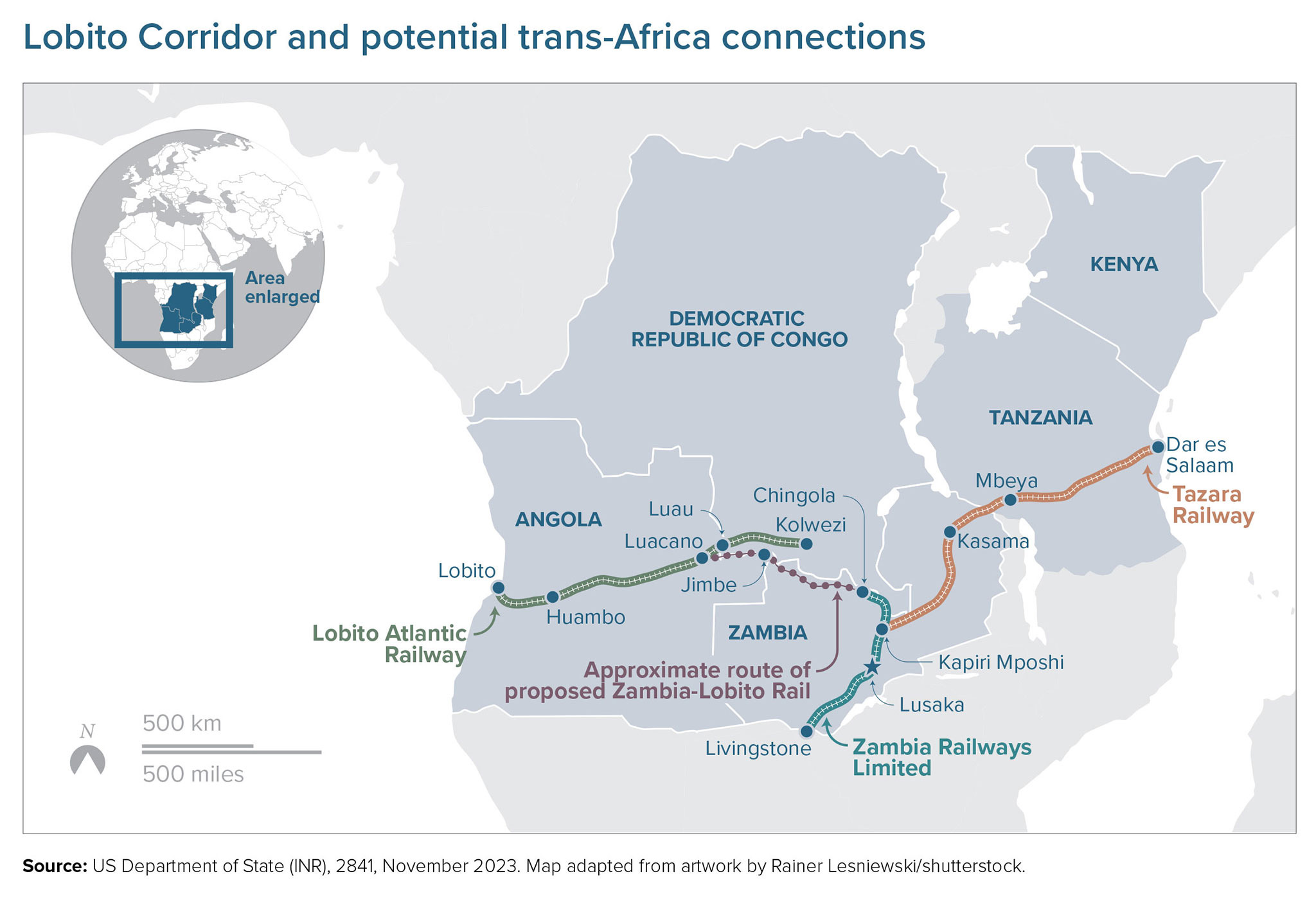
African Interests
The history of natural resource exploitation in Africa is marred by environmental degradation, human rights abuses, corruption and violent conflict. This makes the current interest in critical minerals a time of opportunity — but also concern.
The abundance of critical minerals that many African countries possess, if developed constructively, promise to drive economic development. Responsible mining produces state revenues, local employment, technological transfer and community development. The potential to capture added value by locally processing minerals could also contribute to the industrialization of a low-industrialized continent.
Alternatively, there is no guarantee that Africans won’t suffer the common maladies of the past. These include mineral development that fuels conflict and broad human suffering. The conflict in Mozambique’s Cabo Delgado province — which has displaced over one million Mozambicans — has been partly driven by local grievances over natural gas and critical minerals development, providing a stark example of the pitfalls of natural resource development. These challenges, while not unique to Africa, are compounded by weak government capacity in many African countries.
Building Mutually Beneficial Partnerships
U.S. mining companies have a small presence in Africa. Transportation and energy infrastructure are severely lacking in many African countries, and investment is commonly perceived as being high risk — deterring general U.S. commercial engagement.
Moreover, the Chinese and other firms that currently dominate Africa’s mining sector have employed illegal and unethical business practices that take advantage of — and contribute to — weak rule-of-law in many African countries.
U.S. firms can’t, nor should, compete on these terms, and Africans realize that U.S. businesses generally bring a higher standard of investment, including more sensitivity to transparency, environmental and labor concerns.
The Biden administration is trying to promote this higher-value investment model for critical minerals in Africa. To make U.S. engagement in the African mining sector more appealing, the U.S. International Development Finance Corporation aims to “de-risk” investment on the continent. The United States has a variety of other tools to advance U.S. commercial interests in Africa. But it is still challenging to build mutually beneficial partnerships in the African mining sector, especially when facing Chinese competition.
Geopolitical Competition with China and Russia
For decades, China has been upping its economic engagement throughout Africa, most notably with its Belt and Road Initiative. China is the largest trading partner of many African countries — achieving that by supplanting the United States and European countries in some cases.
China also dominates the supply chains of several African minerals — such as cobalt — shipping the raw material home for value-added processing and global distribution. Beijing has backed its economic activities with well-resourced and dedicated diplomacy, winning favor among Africans, especially government officials.
So while many African countries are seeking to attract U.S. investment, they also generally welcome Chinese investment as well. These African attitudes and China’s deep economic roots make for a difficult commercial landscape for U.S. and Western mining companies on the continent. This landscape requires that U.S. diplomacy deftly and more robustly engage to advance commercial interests, such as through the recently launched Minerals Security Partnership.
Russia also is an actor of growing concern in Africa. Its Africa Corps, which is a rebranded version of the notorious Wagner Group, operates in several African countries suffering violent conflicts. The Africa Corps provides security to authoritarian regimes in exchange for mineral rights, including in the Central African Republic and Mali. This Russian mercenary group abuses human rights and operates without transparency.
Continued Focus on Critical Minerals
Beyond the senior study group’s report, which will be issued in April 2024, USIP’s ongoing activities on critical minerals in Africa includes research, analysis and public events:
- Pétronille Vaweka of the Democratic Republic of Congo received USIP’s 2023 Women Building Peace Award. In accepting the award at USIP, this courageous peacebuilder spoke of the role that critical minerals play in her country’s deadly conflicts, pleading for U.S. attention.
- In April 2024, USIP will host a two-day “peace game” training exercise involving the U.S. State Department, U.S. Agency for International Development, and other U.S. government agencies that will contend with critical mineral disputes in a fictionalized African country.
Featured Resources
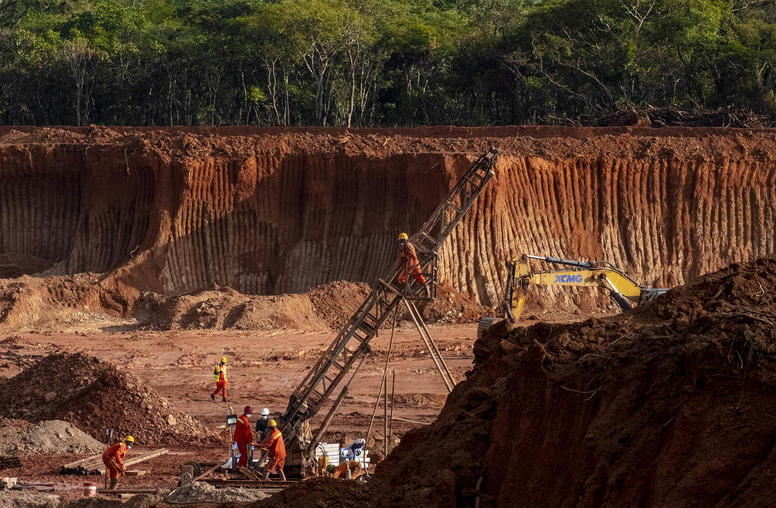
Challenging China’s Grip on Critical Minerals Can Be a Boon for Africa’s Future
Demand for the critical minerals powering the world’s clean-energy technologies, consumer goods and defense applications is skyrocketing. These metals are what the modern economy runs on: we need them for our phones, electric vehicles and satellites, and so much more. Forecasts estimate that in the coming decades, the world will need many times more cobalt, copper, lithium and manganese, among other minerals, than what is currently being produced.

U.S. Plans to Build Africa’s Infrastructure Bring Opportunities, Challenges
An interesting trend is emerging in U.S.-Africa relations: even as the United States moves to counter Chinese influence in key sectors like critical minerals, China’s influence in Africa is subtly reshaping the United States’ own approach to engaging with the continent.
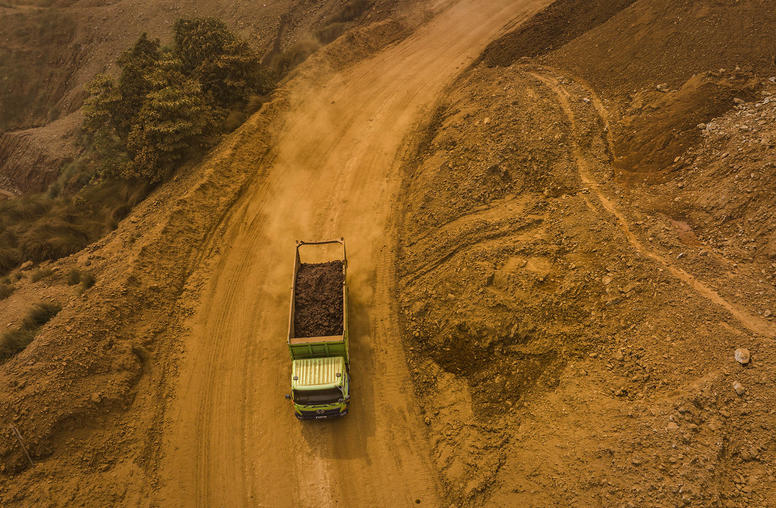
Indonesia’s Nickel Bounty Sows Discord, Enables Chinese Control
As the world moves toward cleaner forms of energy, specific minerals and metals that support this transition have become “critical.” Nickel — a major component used in electric vehicle (EV) batteries — is one such critical mineral. Demand for battery metals is forecast to increase 60-70 percent in the next two decades. This may be a boon for some. But in Indonesia, which produces more than half of the world’s nickel supply, it has led to political, environmental and ethical complications.

Thomas Sheehy on U.S. Investment in Africa’s Critical Minerals Infrastructure
Everything from the economy to national security depends on critical minerals like cobalt — which has prompted immense U.S. investment in Africa’s mining infrastructure, says USIP’s Thomas Sheehy: “Africa is seen as a continent where we can start to very slowly move away from our overdependence on China for critical minerals.”
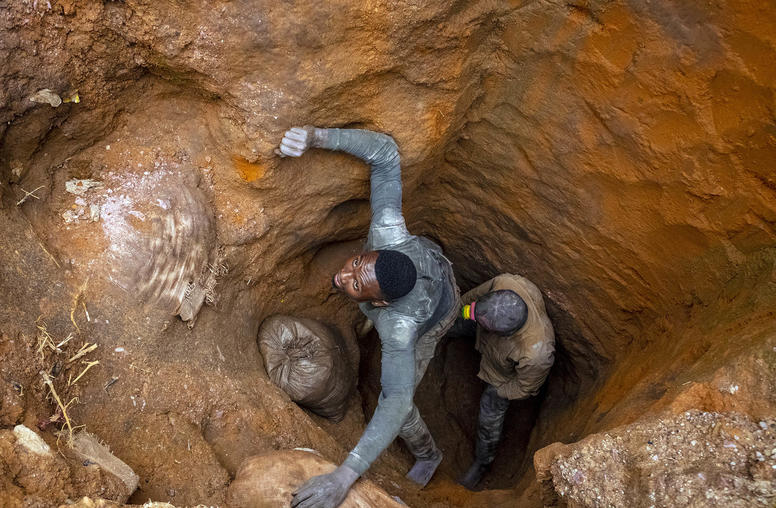
Why Africa’s Critical Minerals Are Key to U.S. National Security
A new USIP report emphasizes the importance of the United States government being engaged in the African critical minerals sector if it is to diminish its dependence on China and fortify its national security and foreign policy interests. Tom Sheehy, a distinguished fellow in USIP’s Africa Center and the report’s executive director, discusses the importance of critical minerals and key recommendations in the report.